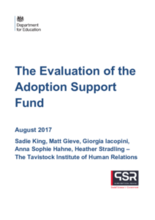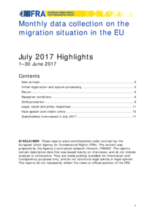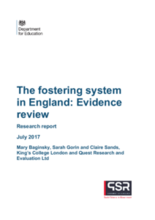

Displaying 1211 - 1220 of 1649
UK government cuts to legal aid in 2012 have greatly impacted unaccompanied migrant children, who are now denied legal aid in non-asylum cases.
Tens of thousands of children referred to England's social services due to abuse or neglect are falling through the cracks because they do not meet the statutory criteria for help.
This article explores young people's experiences in the transition to adulthood from child welfare services and how Honneth's theory of recognition can be useful as an analytical tool to help us understand these experiences.
Informed by a cultural psychological approach to development, the authors analysed interviews with 18 unaccompanied Afghan boys and their professional caregivers.
In this BBC Three documentary, Rebecca Southworth tells her own story about growing up in care and follows the lives of care-leavers and young people in care to explore why so many people with experience in care end up living chaotic lives.
This report presents the findings of an evaluation of the UK's Adoption Support Fund undertaken by the Tavistock Institute of Human Relations.
Concern about the effectiveness of Serious Case Reviews for generating improvements in child protection in England led to proposals in the Wood review to replace the current system with rapid local learning inquiries and a national system of learning from significant incidents. This article challenges both the analysis in the Wood review and the proposals themselves.
This report from the European Union Agency for Fundamental Rights (FRA) provides data on migration throughout the EU from 1-30 June 2017. The report includes data on the child protection situation for migrant children, particularly the identification, emergency placement and accommodation of unaccompanied children.
This study explores whether child and family-related factors are associated with later psychological problems in international adoptees in Finland. Researchers then investigated whether the length of time a child spends at home after adoption and before daycare moderates the aforementioned associations.
Commissioned by England's Department for Education, this review of the fostering system in England provides a look into the details of the foster care system, how it functions and how children in care are impacted by it, and identifies gaps and areas for improvement.



